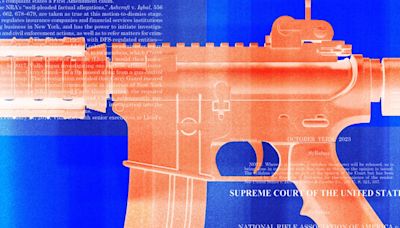Search results
People also ask
What is the rule of law?
What is an example of a rule of law?
Why do we need a rule of law?
Does the rule of Law stand above government?
Perhaps the most compelling example of the rule of law in the United States Constitution is the Fourth Amendment. It stipulates that all searches by governmental authorities or law enforcement can only be done with a warrant.
Rule of law is a principle under which all persons, institutions, and entities are accountable to laws that are: Publicly promulgated. Equally enforced. Independently adjudicated. And consistent with international human rights principles.
- Overview
- Institutions and legal culture
rule of law, the mechanism, process, institution, practice, or norm that supports the equality of all citizens before the law, secures a nonarbitrary form of government, and more generally prevents the arbitrary use of power. Arbitrariness is typical of various forms of despotism, absolutism, authoritarianism, and totalitarianism. Despotic governments include even highly institutionalized forms of rule in which the entity at the apex of the power structure (such as a king, a junta, or a party committee) is capable of acting without the constraint of law when it wishes to do so.
Ideas about the rule of law have been central to political and legal thought since at least the 4th century bce, when Aristotle distinguished “the rule of law” from “that of any individual.” In the 18th century the French political philosopher Montesquieu elaborated a doctrine of the rule of law that contrasted the legitimate authority of monarchs with the caprice of despots. It has since profoundly influenced Western liberal thought.
In general, the rule of law implies that the creation of laws, their enforcement, and the relationships among legal rules are themselves legally regulated, so that no one—including the most highly placed official—is above the law. The legal constraint on rulers means that the government is subject to existing laws as much as its citizens are. Thus, a closely related notion is the idea of equality before the law, which holds that no “legal” person shall enjoy privileges that are not extended to all and that no person shall be immune from legal sanctions. In addition, the application and adjudication of legal rules by various governing officials are to be impartial and consistent across equivalent cases, made blindly without taking into consideration the class, status, or relative power among disputants. In order for those ideas to have any real purchase, moreover, there should be in place some legal apparatus for compelling officials to submit to the law.
Not only does the rule of law entail such basic requirements about how the law should be enacted in society, it also implies certain qualities about the characteristics and content of the laws themselves. In particular, laws should be open and clear, general in form, universal in application, and knowable to all. Moreover, legal requirements must be such that people are able to be guided by them; they must not place undue cognitive or behavioral demands on people to follow. Thus, the law should be relatively stable and comprise determinate requirements that people can consult before acting, and legal obligations should not be retroactively established. Furthermore, the law should remain internally consistent and, failing that, should provide for legal ways to resolve contradictions that can be expected to arise.
For such reasons, the rule of law is best seen not as a blueprint for institutional design but as a value, or cluster of values, that might inform such a design and that can therefore be pursued in a variety of ways. Nonetheless, several rather simple and generalizable institutional insights follow from the idea that those who judge the legality of exercises of power should not be the same as those who exercise it. For instance, a typical rule-of-law state will institutionalize some means of shielding legal officials from interference, political or otherwise, that threatens their independence. Accordingly, the institutional separation of the judiciary from other branches of government is commonly thought to be an important feature of rule-of-law states. Other measures to ensure fair access to legal institutions may also be important for rule-of-law regimes. In addition, a binding written constitution is widely believed to aid the rule of law and has been adopted by most states of the world.
Students save 67%! Learn more about our special academic rate today.
Learn More
While certain institutional traditions and conventions, as well as written laws, may be important to ensure that judicial decisions are grounded within plausible interpretations of existing laws, no single institutional character of a state should be seen as necessary or sufficient to the rule-of-law ideal. The rule of law is tied neither to any one national experience nor to any set of institutions in particular, although it may be better served in certain countries and by some institutions. Moreover, the institutional arrangements that ensure the rule of law in one polity might not be easily duplicated in or transplanted to another. Different polities embody their own judgments about how to implement specific rule-of-law ideals given their particular legal and cultural traditions, which naturally influence the character of their institutions. Nonetheless, the initial sociological condition for the rule of law is shared across cultures: for the rule of law to be more than an empty principle, most people in a society, including those whose profession it is to administer the law, must believe that no individual or group should be above the law.
The rule of law is intended to promote stability, but a society that operates under the rule of law must also remain vigilant to ensure the rule of law also serves the interests of justice. As this quote points out, the continued strength of the rule of law sometimes depends on individuals who are willing to risk punishment in pursuit of justice.
Aug 25, 2014 · The rule of law means general rules of law that bind all people and are promulgated and enforced by a system of courts and law enforcement, not by mere discretionary authority. In order to secure equal rights to all citizens, government must apply law fairly and equally through this legal process.
The rule of law is a political ideal that all citizens and institutions within a country, state, or community are accountable to the same laws, including lawmakers and leaders. It is sometimes stated simply as "no one is above the law". The term rule of law is closely related to constitutionalism as well as Rechtsstaat. It refers to a political ...







